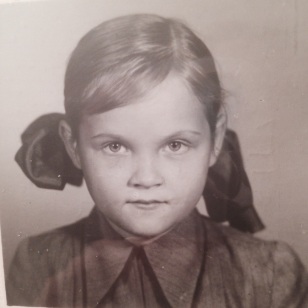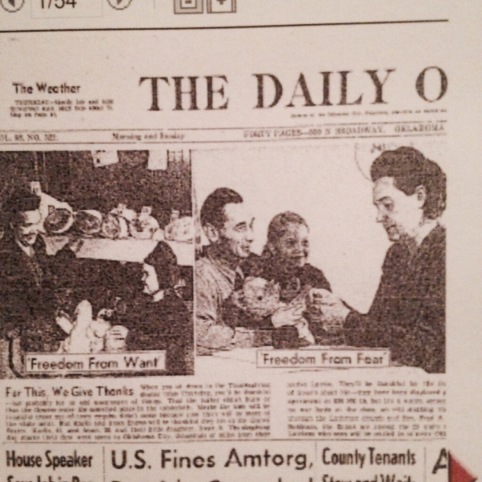
My husband with his grandmother on our wedding day. Without her bravery, I would never have known him.
After barely escaping the firebombing of Dresden, Anna and Irena arrived safely in Austria where they lived in the Alps for several months. Anna got a job as kitchen help to a woman who ran a boys’ boarding school for Austria’s wealthy class. While Anna was busy cooking and cleaning, Irena played outside where the boys at the school taught her how to ski. For the first time in her young life, Irena enjoyed an ordinary childhood filled with the simple things: dry clothes, food, sweets to eat, and jumping up and down on real feather beds that she could actually sink down into.
However, this was not to last. News came that the Russians had taken Hungary and were at the Austrian border. It was time to go. Anna’s husband Karlis arranged for her and Irena to leave the country. They packed their one shared suitcase and left the country, but on May 8, 1945, they found out some incredible news: World War II was officially over! When Anna heard this, she looked down at her baby girl and began to cry.
It was over! It was finally over. And they had survived.
But almost immediately another thought invaded her mind: would they be able to return to Latvia?
History shows that there were more than 100,000 Latvians who either returned to Germany following the war, or found themselves in Germany at the war’s conclusion, and most of them became temporary residents of what was called “the American zone.” These Latvians had to either return to Latvia (which most did not) or stay in temporary refugee housing, awaiting relocation.
Anna decided it was best to not return to Latvia, so she and Irena spent several years in DP (Displaced Persons) camps set up by Americans. It was temporary housing, and much of what happened was unplanned and unpredictable – the size of the camps, how crowded, how quickly people would be assigned to sponsors, when and where they would get food and how much per family, how would they find their relatives, and most importantly: which country would take them in. Refugee housing was humble and challenging: sometimes 8 families had to share a single room, with sheets hung between beds for privacy.

Irena, seven years old, when she was living in Germany in a Displaced Persons Camp.
Because there were so many refugees that needed homes, some nations, like the United States, Canada, and Australia (among others), stepped forward to allow some of them to come to them. However, a refugee’s family needed to be sponsored by a family from the sponsoring country.
“Whichever country picks us, we will go there.” Anna said to Irena. Karlis was secretly hoping for the United States, but there were other countries that were willing to take these refugees, and they had no idea where they would end up. However, it is rumored that Karlis, a well connected man, had called in some favors to request being sponsored to come to the United States. Still, their future hung in the balance.
Finally, the day came when they didn’t have to wait any longer to find out where they would be living.
“Pack your bags Irena,” Anna said with a gleam in her eye. “We are going to America!”
In the spring of 1949, Karlis, Anna and Irena were sponsored to come to America by the First Lutheran Church in Oklahoma City. They boarded the HMS Stewart, a troop carrier, and crossed the Atlantic. Anna breathed a huge sigh of relief when she saw the statue of Liberty. After New York they still had to make their way to New Orleans. Finally, on November 15, they arrived at the harbor in New Orleans and boarded a train to Oklahoma.

Their arrival made the front page of the Daily Oklahoman newspaper.
To celebrate their arrival, the family of three enjoyed their first hamburger. Later, they found out that they were the first refugee family to arrive in Oklahoma City as a part of the church’s refugee relocation project. The church provided living quarters in their community building (upstairs was a complete apartment), in return for which Anna and Karlis maintained and cleaned the church and the church’s community building. After they settled into America, Karlis and Anna celebrated the birth of their daughter, Aija.
The years flew by and Irena eventually grew up, met another Latvian refugee also named Karlis, got married and had three sons – Eduard, Erik, and Andrew. Their middle son is my husband, Erik.
As Anna grew older, she was still unsettled about one final issue: her relationship with the Lord. Although she knew without a doubt that God had indeed protected her and Irena throughout the war, she was uncertain as to whether she would be admitted into heaven when she passed. Her grandsons and their wives shared the gospel with her many times, and one day Irena presented a simple gospel tract in Latvian to Anna. The tract said that God loved her and desired a relationship with her, but that sin separated her from that relationship. Repentance of sin and faith in Jesus Christ for the forgiveness of sins would restore that relationship and give her the peace she was searching for, peace to know that her sins were forgiven and her soul was secured forever in Heaven with God. After reading the tract, Anna turned to Irena and indicated that she wanted to pray to receive Christ as her Savior. In Irena’s own words:
“She prayed the prayer with me, and her eyes filled with tears as she expressed sheer gratitude for sharing this with her. No longer would she need to talk about going to heaven in terms of “I hope.” She was elated, and amazed at how simply and easily that light went on and now she understood.”
Two years later, on November 25, 2012, Anna passed into eternity at the age of 100, leaving a shining legacy of courage and tenacity to all of the generations that now enjoy this wonderful home we all call America. Her three grandsons gave her Eulogy, and she was buried in Wisconsin with her family and close friends at her side.
Closing comments:
Our family recently watched Back to the Future, which made me think of this story. If Anna and Irena had not survived the war, Erik would not be here, and I would not be here, at least in the same way. We would have never adopted our three beautiful kids, with one more adoption on the way. It’s crazy to me that of the 60 million refugees wandering around during World War II, that Anna, Karlis, and Irena made it to the United States, especially considering that only 34,000 Latvians immigrated to the U.S. following the war. It was clearly God’s will for them to survive the war, start a new life in America, and have kids and grandkids.
I miss “Grannie Annie” as we lovingly called her. She would tell us all of the stories I have chronicled here, and many more that went unrecorded, in her thick Latvian accent. So many times the six of us grandkids (the three boys and their three wives) would spontaneously exclaim: “Man. We need to write all of this down, Granny Annie! It’s so amazing how you and mom even survived! Someone’s gotta write this stuff down!”
So here it is, peeps.
I know Anna is looking down from Heaven and smiling on her family tree. There is a little bit of Granny Annie in every single member of my husband’s family, and I’m so grateful to know each of them and call them my family as well. Of course, I am partial to Grannie Annie’s favorite grandson Erik. I think Erik is her favorite because he resembles her first husband, Juris. (I am also putting this sentence in here to see if anyone in the family will notice. Ha.)
So Granny Annie, if you are reading this blog from Heaven: Thank you for your courage and drive, because none of us would be here if it weren’t for you. We’re proud of you and we will have a big party in Heaven when we get there. Your stories and miracles have bolstered my faith. We love you! Love, your Granddaughter, Heather
I hope Anna’s story has bolstered your faith as well, My Dear Reader.
________________________________________________________________
A few additional research notes:
All told, by some estimates, a total of about 60 million Europeans became refugees during the entire World War II period. According to the United Nations, a million people had yet to find a place to settle by 1951, more than five years after the fighting stopped.http://time.com/4029800/world-war-ii-refugee-photos-migrant-crisis/
By 1959 some 900,000 European refugees had been absorbed by west European countries. In addition, 461,000 had been accepted by the USA, and a further 523,000 by other countries. But many ‘hard-core’ refugees still remained in camps.http://www.bbc.co.uk/history/worldwars/wwtwo/refugees_01.shtml

Pingback: Escape from Latvia part V – Last Train out of Dresden – Permission 2 Speak Freely
Pingback: Escape from Latvia -Anna’s story, Part I – Permission 2 Speak Freely
Lovely story of “Granny Annie,” the amazing woman I’ve know all my life as Great Aunt Anna. She touched so many lives with hers. The photos here are recognizable – well placed. I never made the connection between the two “Karlis” before, and yes your Erik does look like Juris. You’ve captured the great drama of family in panoramic view!
LikeLiked by 1 person
Thx Dace! Thx for reading! ❤️️
LikeLike
Lovely reply, thank you my dear. So thankful you are part of family!
LikeLike
What an amazing, miraculous story! Just amazing! AND, am I the only one who thinks Logan his the spitting image of the 7 year old picture of Irena?!?!?!?!?
LikeLike
Yes! I agree. Logan does look like Irena!!! Thx for reading!
LikeLike